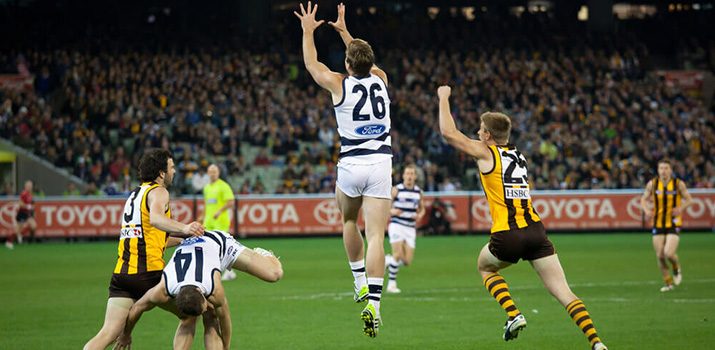AFL $1Billion Class Action Explained

A class action lodged in the Supreme Court of Victoria this week could have massive implications for Aussie Rules as we know it. What happens next?
More than 60 players have joined the class action suit, seeking compensation for injuries sustained while training or playing AFL between 1985 and March 14 2023. According to reports, players are seeking up to $1billion in damages, collectively.
The injuries named in the claim include the impact of concussion, a head injury usually caused by a direct blow to the head, face or neck.
Seeking compensation
The class action states that some players have suffered long-term injuries including various neurological impairments, such as chronic traumatic encephalopathy (CTE), traumatic brain injury (TBI) and dementia, along with various psychological issues, including depression, post traumatic stress disorder (PTSD) and suicidal ideation.
Players are seeking compensation for pain and suffering, economic loss, and medical expenses.
This is not the first case of its kind.
Concussion cases in other sports
In 2017, former NSW State of Origin player James McManus took legal action against the Newcastle Knights over the club’s handling of his concussions.
Just prior to Mr McManus taking legal action, the National Football League (NFL) in the US was finalising an historic settlement to more than 4500 retired players, for almost $US1 billion, for injuries sustained during play.
James McManus played 166 NRL games for the Knights before retiring on medical grounds at the end of the 2015 season.
His claim alleged that the Knights had breached its duty of care, and also stated that he had missed out more than $700,000 in wages that could have come later in his career, as well as claims for other medical expenses.
Mr McManus asserted that he should have been warned of the risks of playing when concussed or when he was recovering from concussion, and he was not.
His claim detailed a number of ongoing disabilities including cognitive impairment, impairment of memory, mood swings, headaches, anxiety, depression, lethargy and sleep disturbance.
In its defence, the Knights said at the time that the risk to Mr McManus was “obvious” and any claim should be waived. The NSW Supreme Court made a judgment in the Knight’s favour – a decision which was considered to have implications for further cases of this kind against the NRL.
Concussion protocols are quickly changing
In recent days the AFL’s protocols for concussion have been firmly in the spotlight – there is a mandatory 11-day stand down period for concussed players.
The Australian Rugby League Commission has confirmed reports it is now aligned with the AFL and world rugby in introducing the same rule.
What happens next?
The AFL will have to let the case play out. Some have suggested that such a case could financially decimate the game.
Lawyers representing the players have suggested they would be open to negotiation. If mediation and negotiation is successful, the case may never end up in court.
In the meantime,the AFL says it has made at least 30 changes to on-field rules in recent years to make the sport safer. And this is important to ensure the safety of players, and to keep the popularity of the sport alive.
In Western Australia, AFL is the most popular sport in the state.
Class Action lawsuits in Western Australia
Class Action lawsuits are sometimes known as ‘representative proceedings'.
They arise when a large number of people who are affected by alleged similar wrongdoings, such as the AFL players, and youths who spent time in the Banksia Hill detention centre, band together to pursue legal action together, as a group, rather than doing so individually.
Usually one person is nominated to be the ‘lead plaintiff’.
What is a Plaintiff?
Plaintiffs is the name given to the party who initiates the legal action. Defendant is the name given to the party who is defending allegations / a civil suit.
What is the role of the Plaintiff in a civil lawsuit?
In a civil suit, the plaintiff is required to prove their claim with evidence and they bear the “burden or onus of proof”, meaning it is up to the plaintiff to provide the court with sufficient evidence in relation to their claim, in order to substantiate it.
Recent Changes to Civil Procedure in Western Australia
Last year, important changes were made to Western Australia’s Civil Procedure (Representative Proceedings) Act 2022 (Act). This is the Act which governs how class actions are established, and how they proceed through court.
Western Australian Attorney General, John Quigley MLA, says the changes bring Western Australia into line with the regines in operation in Victoria, New South Wales, Queensland and Tasmania, as well as the Federal scheme.
While there are concerns that the changes will pave the way for an increase in class action cases, it’s important to remember that people must have equitable and easy access to the courts in any situation where they believe justice needs to be served.
Need Legal Advice?
Andrew Williams is an experienced Criminal Lawyer and Barrister operating in Perth or Fremantle who will provide you with expert legal advice.
Andrew offers a range of criminal law services in WA and he can guide you through your legal matter whilst working towards the best outcome for your case.
Call Now: (08) 9278 2575
This post is informative only. It is not legal advice. If you have a specific legal matter you’d like to discuss, please contact us.
PLEASE NOTE: The material in this blog post is for informational use only and should not be construed as legal advice. For answers to your questions regarding this or other topics, please contact a professional legal representative.
